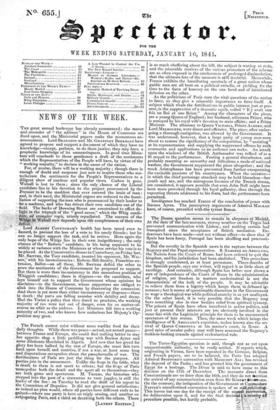The French cannot exist without some warlike food for their
daily thoughts. While there was peace—actual, not armed peace- - between France and Europe, she could find nothing better to stay her appetite thap a little peddling war with Buenos Ayres and some dilettante bloodshed in Algeria. And now that her greed for glory has been balked by the rest of Europe, she must fain turn back upon herself, and contrive, if not a war, at_ least some long and disputatious occupation about the paraphernalia of war. The fortifications of Paris are just the thing for the purpose. All parties join in the amusement. Unlike the frogs in thp fable what ss death to them is not sport to others; but the frogs of Paris monopolize both the death and the sport all to themselves—they are both game and sportsman. M. TRIERS, the historian who stepped into the post of a statesman to turn juggler, is still the leader of the fun : on Tuesday he read the draft of his report to the Committee of Deputies. It did not give general satisfaction; as indeed no plan would, where all parties have different ends to be gained—where one party is bent on triply arming, and another on subjugating Paris, and a third on deceiving both the others. There
is so much chaffering about the bill, the subject is waxing so stale, and the miserable motives of the various promoters of the scheme are so often exposed in the carelessness of prolonged dissimulation, that the ultimate fate of the measure is still doubtful. Meanwhile, France exhibits the humiliating spectacle of a great nation whose public men are all bent on a political swindle, or yielding for the time to the force of knavery on the one hand and of intoxicated delusion on the other.
As the politicians of Paris turn the vital questions of the nation to farce, so they give a miserable importance to farce itself. A subject which rivals the fortifications in public interest just at pre- sent, is the suppression of a dramatic squib, called " Il y avait une foie un Roi et une Reine." Among the characters of the piece, are a young Queen of England; her husband, a German Prince, who is annoyed by his royal wife's devotion to state affairs ; and a Prime Minister. The allusions to Queen VICTORIA, Prince ALBERT, and Lord MELBOURNE, were direct and offensive. The piece, after under- going a thorough castigation, was allowed by the Government. It was understood, however, that a large party of young men were about to restore the significancy of the composition, by " assisting" at its representation and supplying the suppressed offence by such comments and applications as an audience can make. An attack upon the windows of the British Ambassador was talked of as a fit sequel to the performance. Fearing a general disturbance, and probably resenting so unworthy and ridiculous a mode of national warfare, the Government suppressed the piece altogether ; and the mock Aristophanes has been prevented from further exasperating the excitable passions of his countrymen. When the occasion— in which the chief personage attacked may be held blameless—her youth and sex, and the outrageous licences of the French drama, are considered, it appears possible that even John Bull might have been more provoked through his loyal gallantry, than through the vapouring threats addressed to his fears, had the performance been permitted.
Intelligence has reached France of the conclusion of peace with Buenos Ayres. The peremptory arguments of Admiral Miciuu have, of course, prevailed with-the tyrant Rosas. ' '


























